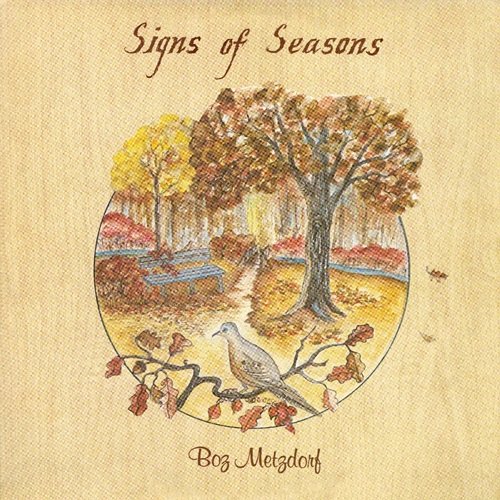Boz Metzdorf’s album Signs of Seasons, a cosmic folk ode to and from America’s heartland at the turn of another century, is given new space for its enduring charisma with a first ever digital reissue on Anthology Recordings.
Robert “Boz” Metzdorf — aka Biz Mitzwah, the art design sobriquet he used in the credits for Signs of Seasons— arrived at the tail end of World War II in Norfolk, Virginia to a naval officer father and a mother entranced by radio’s golden age of sound. After Boz’s family relocated to St. Paul, Minnesota in the early ‘60s, Metzdorf fell under the spell of radio mainstays like The Everly Brothers, Buddy Holly, and Gene Vincent, and soon after picked up his first six-string.
In 1964, Metzdorf formed The Missing Lynx, his first teenage garage band. After a line up unique to the period which included both a female lead guitarist and bassist, Steve Keys and Doug Rymerson eventually became full-fledged members in 1966. Metzdorf, Keys and Rymerson eventually completed the Minnesota-based, six piece, folk-country combo Freeland, known for their privately-issued Headin’ Back album on Moonchild Records from 1972. Following the dissolution of Freeland in 1976, Metzdorf began playing with some of his ex-bandmates in Bizzy Wiggins, a collaborative setting in which Signs of Seasons took form from a song catalog Metzdorf had been crafting 1967.
The self-financed sessions for Signs of Seasons commenced in winter of 1977 at Sullivan Sound Recording in St. Paul, running through spring of the following year. Co-produced by Metzdorf and Jim Maloney, who also arranged the string sections and played some piano and synthesizer on the album, the Signs of Seasons sessions included contributions from the majority of Freeland’s original lineup — Keys (bass/electric guitar/viola), Rymerson (electric guitar/slide guitar/harmonica), Tom Wiggins (piano/synthesizer/vocals), and, of course, Metzdorf (vocals/acoustic guitar)—as well as some local session players on various accompanying instrumentation.
While, retrospectively, you can trace a continuation of the going-up-the-country generation’s evolving aural tapestries and interests, the few fans of Freeland who were lucky enough to hear Signs of Seasons contemporaneously were in for a big surprise. The album carries a distinctly accomplished, high-budget and at times lush sound with varied instrumentation. It sounds unlike many other private-issue albums from the era. The players utilize their deep-seated, hive mind from the long hours, and years, of performing together to capture studio perfection in a positively baffling first or second take.
Spearheaded by Metzdorf, the combo broadens their prior collaboration into a palette of country, folk, jazz, and rock, capturing a ubiquitously breezy, mid-to-late-70s sound. That sound mirrored the vibrations being created further west with pinpoint accuracy, bringing to mind similar regional, eccentric anomalies like the Tumbleweed Records stable in Colorado, variety-stricken private press Americana mavens like Michigander Jeff Cowell, and the Californian-rooted and Hawaiian-based recordings of Merrell Fankhauser. All artists with one foot in the past, while resolutely dwelling in the present.
Metzdorf, a former poet and art major with a minor in journalism, peppers the song lyrics of Signs of Seasons with searching, near mystical poeticism, and a wonder of nature strengthened by a fondness for Robert Frost’s environmental poems. The album traces Metzdorf’s personal journey and mind’s eye ruminations on youthful infatuation (“Childhood Sweetheart” set to lap steel-accented country-rock), the pure, untainted love for a child set to baroque and classical guitar figures in “Music Box,” and the eternal nourishing force of nature in the love letter to the Earth Mother in the title track (resplendent with swelling strings).
Metzdorf retreats from the ruined world to off-the-grid country simplicity (“Down On The Farm”), and the depression and despondency that forced him from civilization after a disappointing band split and his hopeful return( the late psych / AOR glide of “Sails Across The Sea” and the Pacific Highway soft rock of “Calling You Home,” respectively). Metzdorf concludes Signs of Seasons with “Making Waves,” a witty, jovial ’n’ jazzy anti-establishment ditty carrying some of his mother’s musical influence via Dan Hicks and His Hot Licks, or early Loudon Wainwright III.
Originally issued in the summer of 1978 on the fly-by-night Centurion Records (seemingly, another tale in the tax scam records saga), the scarce collection of richly melodic, rural singer-songwriter Americana tunes which comprise Signs of Seasons can finally be accessed to dance in the imagination of all “city settlers and country slickers.”




